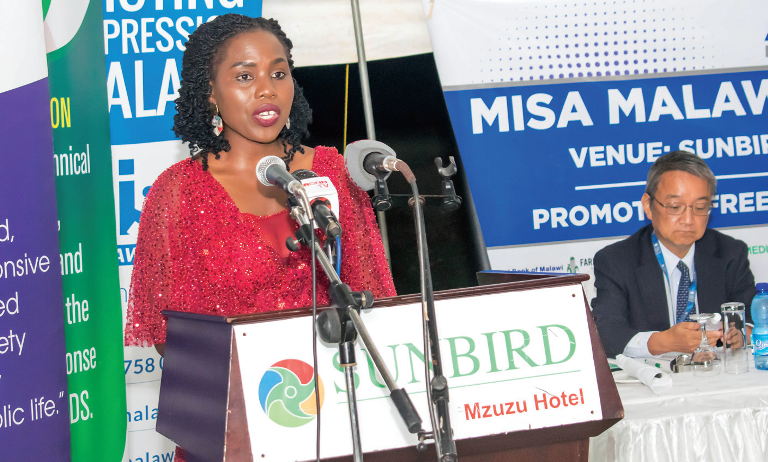The Constitutional Court (ConCourt) in Blantyre will on April 27 2023 hear a substantive matter in which the constitutionality of outlawing homosexuality in the country is being challenged.
This follows a constitutional referral matter of 2021 involving a Dutch national Jan Willem Akstar and a transgender woman Jana Gonani who are challenging the constitutionality of banning same sex marriages in the country.
A ruling in favour of the two would effectively legalise same sex marriages and lesbian, gay, bisexual and transgender, and intersex (LGBTI) activities in the country, which are outlawed by sections 153 and 156 of the Penal Code.
Akstar and Gonani moved the Constitutional Court to declare the two pieces of legislation unconstitutional arguing that they violate their right to privacy, dignity, among others.
Section153 states that any person who has carnal knowledge of any person against the order of nature shall be guilty of a felony and shall be liable to imprisonment for 14 years.
On the other hand, Section 156 provides that any person who, whether in public or private, commits any act of gross indecency with another male person…shall be guilty of a felony.
Akstar, 51, is facing nine charges of sexual abuse and sodomy.
He is accused of molesting students and employees at Timotheos Foundation when he was working as financial manager at the Mapanga-based orphanage in Blantyre and is alleged to have committed the crimes between January 2018 and April 2020.
Timotheos Foundation offers a bursary scheme by paying school fees for needy students. Akstar is alleged to have been taking advantage of this scheme to force himself on beneficiaries.
On the other hand, Gomani was convicted by Senior Resident Magistrate Court in Mangochi in December 2021 of two offences of obtaining by false pretences and unnatural offences contrary to Section 119 and 1539(c) of the Penal Code, respectively.
He was sentenced to three years on the first count and three years on the second count and eight years on the third count.
He later filed summons on application for referral for certification of the matter as constitutional under Section 9(2) of the Courts Act in relation to the third count.
In an interview on Thursday, Akstar’s lawyer Fostino Maele said he is ready as a representative of the claimant to make his arguments.
Said Maele:” The court will hear arguments from all the parties including Attorney General, Centre for Human Rights, Education, Advice and Assistance as amicus curiae and the defendant.”
When contacted for comment on the State’s preparations, Ministry of Justice spokesperson Pirirani Masanjala said: “We will file a response to the Gonani case in due time. By the 27th, all auxiliary issues will have been sorted out since they are minor.”
In September 2021, the State filed an application for the matter to be dismissed following failure by the claimant to comply with Order of Directions to serve and file skeleton arguments and list of authorities by August 20 2021.
However the court whilst agreeing with the State ruled that the issues raised in the constitutional referral are of importance.
In its ruling on November 16 2021 justices Joseph Chigona, Vikochi Chima and Mandala Mambulasa said that the court was ‘mindful of the importance of issues being raised in the constitutional referral.
Reads the judgement in part: “We are of the considered view that the constitutional referral deserves another chance. As alluded to, it raises issues of constitutional importance. Striking out the matter at this juncture will not be fair and just. It will be tantamount to extinguishing the rights to parties herein.”
In 2012, the Ministry of Justice issued a moratorium on arrests and prosecutions for consensual homosexual acts. However, a 2016 High Court order suspended the moratorium pending judicial review by the Constitutional Court.
The moratorium goes back to 2010 on the conviction of Steven Monjeza and Tiwonge Chimbalanga who were arrested for so-called unnatural offences and indecent practices between males under Sections 153 and 156 of the Penal Code.
The two were sentenced to 14 years in prison. However, former president Bingu wa Mutharika pardoned them in May 2010 on humanitarian grounds following condemnation by the international community.
Rights campaigners say current laws against LGBTI are a violation of human rights. Some human rights campaigners argue that sections 153 and 156 of the Penal Code which outlaw sexual intercourse between people of the same sex, contravene the Constitution and international conventions that guarantee equality and non-discrimination regardless of sexual orientation.
Section 20 of the Malawi Constitution says discrimination against persons in any form is prohibited and all persons are guaranteed equal and effective protection against discrimination because of race, colour, sex, language, religion, political or other opinion, nationality, ethnic or social origin, disability, property, birth or other status.
The post Same sex law on trial first appeared on The Nation Online.
 Moni Malawi
Moni Malawi 

